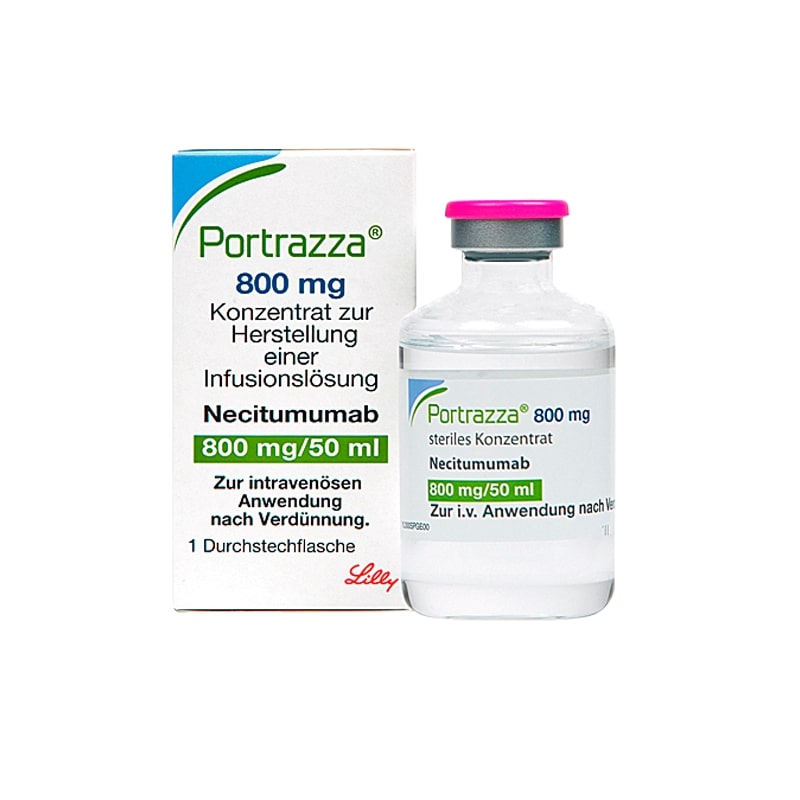Portrazza (necitumumab) vs Keytruda (pembrolizumab)
Portrazza (necitumumab) vs Keytruda (pembrolizumab)
Portrazza (necitumumab) is a monoclonal antibody designed to target and block the epidermal growth factor receptor (EGFR), which is often overexpressed in certain types of lung cancer, specifically squamous non-small cell lung cancer (NSCLC). Keytruda (pembrolizumab), on the other hand, is an immune checkpoint inhibitor that targets the PD-1 receptor, thereby enhancing the body's immune response against various cancers, including melanoma, NSCLC, and head and neck cancers. The choice between Portrazza and Keytruda would depend on the specific type of cancer, its molecular characteristics, and the patient's overall health profile, as these medications have different mechanisms of action and are approved for different indications.
Difference between Portrazza and Keytruda
| Metric | Portrazza (necitumumab) | Keytruda (pembrolizumab) |
|---|---|---|
| Generic name | Necitumumab | Pembrolizumab |
| Indications | Metastatic squamous non-small cell lung cancer (NSCLC) | Various including melanoma, NSCLC, head and neck cancer, Hodgkin lymphoma, and others |
| Mechanism of action | Epidermal growth factor receptor (EGFR) antagonist | Programmed death receptor-1 (PD-1) blocking antibody |
| Brand names | Portrazza | Keytruda |
| Administrative route | Intravenous infusion | Intravenous infusion |
| Side effects | Rash, magnesium depletion, venous thromboembolism, etc. | Fatigue, cough, nausea, itching, rash, decreased appetite, etc. |
| Contraindications | None known specifically; use caution in patients with dermatologic toxicities, venous thromboembolism, and electrolyte abnormalities | Severe hypersensitivity to pembrolizumab or any of its excipients |
| Drug class | Monoclonal antibody | Monoclonal antibody |
| Manufacturer | Eli Lilly and Company | Merck & Co., Inc. |
Efficacy
Portrazza (Necitumumab) Efficacy in Lung Cancer
Portrazza (necitumumab) is a monoclonal antibody designed for the treatment of advanced squamous non-small cell lung cancer (NSCLC). It targets the epidermal growth factor receptor (EGFR), which is often overexpressed in squamous NSCLC cells. The efficacy of Portrazza was evaluated in a clinical trial that included patients with advanced squamous NSCLC who had not received prior chemotherapy for their advanced disease. In this trial, Portrazza, in combination with chemotherapy, showed a statistically significant improvement in overall survival compared to chemotherapy alone. Patients treated with Portrazza plus chemotherapy had a median survival of 11.5 months compared to 9.9 months for those who received chemotherapy alone.
However, it is important to note that Portrazza is not indicated for patients with non-squamous NSCLC. Its efficacy has been specifically demonstrated in the squamous subgroup of NSCLC, which is a distinction that healthcare providers must consider when choosing a treatment regimen for their patients with lung cancer.
Keytruda (Pembrolizumab) Efficacy in Lung Cancer
Keytruda (pembrolizumab) is a highly effective immunotherapy drug used in the treatment of various types of cancer, including lung cancer. For NSCLC, Keytruda's efficacy has been demonstrated in several clinical trials. It works by targeting the programmed death receptor-1 (PD-1) pathway, thereby enhancing the body's immune response against cancer cells. In patients with metastatic NSCLC whose tumors express PD-L1, Keytruda has been shown to significantly improve overall survival rates compared to traditional chemotherapy. The improvement in survival was particularly notable in patients with high PD-L1 expression.
Keytruda has also been approved for use as a first-line treatment in certain patients with metastatic NSCLC. In this setting, it has been shown to improve progression-free survival as well as overall survival when compared to standard chemotherapy regimens. The efficacy of Keytruda has established it as a standard of care in the first-line treatment of PD-L1 positive NSCLC, changing the treatment landscape for this disease. As with all treatments, the efficacy of Keytruda can vary based on individual patient factors, including the level of PD-L1 expression and the presence of specific genetic mutations.
Regulatory Agency Approvals
Portrazza
-
European Medical Agency (EMA), European Union

-
Food and Drug Administration (FDA), USA

-
Health Canada

Keytruda
-
European Medical Agency (EMA), European Union

-
Food and Drug Administration (FDA), USA

-
Health Canada

-
Therapeutic Goods Administration (TGA), Australia

-
Medsafe (NZ)

Access Portrazza or Keytruda today
If Portrazza or Keytruda are not approved or available in your country (e.g. due to supply issues), you can access them via Everyone.org.
How it works

Make an enquiry
Choose the medicine you want to buy, answer a couple of questions, and upload your prescription to speed things up. We’ll get back to you within 24 hours.


Make an enquiry
Choose the medicine you want to buy, answer a couple of questions, and upload your prescription to speed things up. We’ll get back to you within 24 hours.


Breeze through the paperwork
We'll guide you through the required documents for importing unapproved medicine, ensuring you have all the necessary information.


Get a personalized quote
We’ll prepare a quote for you, including medicine costs and any shipping, administrative, or import fees that may apply.


Receive your medicine
Accept the quote and we’ll handle the rest - sourcing and safely delivering your medicine.

Some text on this page has been automatically generated. Speak to your physician before you start a new treatment or medication.
Let's talk
If you have any questions, call us or send us a message through WhatsApp or email:
Contact us




